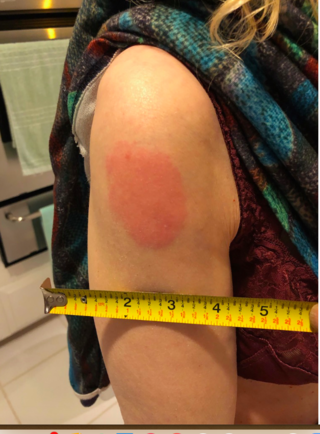Placebo
What’s the New Phenomenon Called “COVID Vaccine Arm”?
The eighth day delayed reaction to the Moderna COVID-19 vaccine.
Updated May 22, 2024 Reviewed by Kaja Perina
- The author, who is also a physician, experienced an 8th day delayed injection site reaction after her first Moderna COVID-19 vaccine dose.
- The author's documentation of her symptoms in this post generated 396 reports by readers of similar symptoms after the first vaccine dose and 44 reports of what happened after the second dose; the same phenomenon has been reported nation-wide.
- The reaction is now known as "COVID vaccine arm," and resolves in all documented cases, as do other side-effects of the COVID-19 vaccine.
Reactions to the COVID-19 mRNA vaccine usually last three or four days after the first shot, but a new side effect is beginning to appear in some patients, including me, on day eight after the first shot. It's been called “COVID vaccine arm.”
Two weeks ago, in Los Angeles, I had my first Moderna COVID-19 vaccine shot in my right upper arm. I had pain and a little redness in that arm for the expected 48 hours after the shot, but those symptoms disappeared quickly.
I thought I was done with the side effects when, on day seven after the vaccine shot, as I was going to bed, I started itching at the injection site. I didn’t think much of it and fell asleep.

When I woke up on day eight after that first vaccine shot, my right upper arm was very itchy, and a red, round lesion about two inches in diameter was at the place where I had the shot. As my underarm felt swollen, I put my left hand under my armpit and felt an enlarged lymph node. I had no fever, muscle ache, no other systemic symptom or rash in any other part of my body. I was puzzled.
As a physician, I knew the possible side-effects of the new Moderna COVID-19 vaccine: fever, muscle pain, local redness, local swelling and axillary (arm pit) lymph nodes, but those were supposed to occur only the first few days after the shot. I hadn’t heard about any eighth-day reaction. Wanting to learn more, I searched for what the literature said but I couldn’t find anything mentioning an eighth-day reaction. (There are now multiple news reports addressing this phenomenon). At the time, though, I wondered, whether I had an infection. That seemed unlikely because the local red lesion was not painful.
I thought my lesion was probably a delayed hypersensitivity reaction to the vaccine. But was I the only one? Were there other people like me with the same delayed reaction? I called a few physician friends who had received the same Moderna vaccine as me, but nobody had any delayed reaction nor had anybody heard about such a delayed reaction with that vaccine.
The Moderna site didn’t talk about any delayed reaction nor did the CDC or FDA site.
I was about to report this to the CDC when a physician friend of mine let me know that she was part of a group of health care practitioners comparing notes after the vaccination and that in her group, one physician had described the same delayed reaction as mine.
Relieved to hear that at least one other physician had been like me—her name was Linda—I contacted her and learned that she had received her first Moderna COVID-19 shot in New York one week before me.
Linda let me know that her reaction was even worse than mine. Not only did Linda have fever, chills, fatigue and muscle aches for a couple of days after the first shot, but she also had a 6-by-10-cm itchy, red, and swollen lesion on her upper arm that started at day eight and lasted four days before decreasing. Linda was concerned about getting the second dose of the vaccine (read my other blog : Why do mostly women report "COVID vaccine arm").
I was relieved to hear that Linda’s reaction only lasted a few days.
It was time to do some research and call a few physicians: allergy specialists, immunologists, and dermatologists.
One of those physicians sent me a detailed article from the Infectious Disease Society, the first one mentioning a delayed reaction after the Moderna COVID vaccine. Here is what was written about the Moderna clinical trial involving 15,181 people injected with the Moderna vaccine and the same amount of people injected with a placebo:
Delayed injection-site reactions (those with onset on or after day 8) were noted in 244 participants (0.8%) after the first dose and in 68 participants (0.2%) after the second dose.
Reactions were characterized by erythema, induration, and tenderness, and they resolved over the following 4 to 5 days.
What a relief! Linda and I were not the only ones with this delayed reaction to the Moderna vaccine. In fact, there had been an extra 244 of us after the first dose.
What caused this delayed reaction?
I asked Edward Jeffes, M.D., Ph.D., a dermatologist with over 30 years of clinical experience with research expertise studying cytokines. Dr. Jeffes explained that my reaction was probably a type 4 delayed hypersensitivity reaction to the vaccine, the kind of reaction people can have when they are exposed to poison ivy or to the tuberculin skin test.
Dr. Jeffes said: “Those delayed-type hypersensitivity reactions, when localized, are typically not serious and disappear after a few days to a week or so. The immune response takes six days to develop and it takes another 48 hours to develop a delayed-type hypersensitivity reaction so this is consistent with the eighth day delay in the onset of the rash.”
During that time, Linda had contacted the CDC describing her symptoms. The CDC told her that her symptoms “were unlikely to represent a long-term safety concern” and were “not considered a precaution or contraindication to vaccination with the second dose.” The CDC recommended having the second injection in the other arm.
This was very reassuring.
One question is: What is this delayed reaction due to? Is it due to the mRNA in the Moderna vaccine triggering the synthesis of spike proteins (most likely) or is it due to Polyethylene Glycol or any other inactive ingredient contained by the vaccine? More research is needed to answer this question.
Another question is: Will the same delayed reaction happen with the second dose of the Moderna vaccine? (read my other blog: "After 'COVID vaccine arm', should I use switch arms for the second shot?")
In the clinical trial, it seems that fewer people had a delayed reaction with the second dose, but the study was done on only 15,181 people injected with the vaccine and the same amount of people injected with a placebo.
As more and more people get the Moderna COVID-19 vaccine, more cases of “COVID vaccine arm” are being reported. As of yesterday, those delayed cases are mentioned in virtual medical Grand Rounds (some reactions described in Grand Rounds are more severe than mine, with patient’s whole upper arm swollen, red and itchy) and in the news. The CDC recommendation remains the same: Get the second injection as planned but get it in the other arm.
With the new mRNA vaccines given to millions of people all around the world, we are in a giant clinical trial and it is our duty to understand and report new vaccine reactions.
So, if you or your loved one has an unexpected reaction to the COVID-19 vaccine, please report it to your doctor, who will report it to the CDC.
In addition, register with Vsafe.cdc.gov through your smartphone as soon as you get your vaccine so that you can be automatically monitored on a regular basis.
We are in this all together and our duty is to help each other.
Follow-up: My upper arm redness lasted three days without taking any medication for it. Two weeks after the first vaccine injection, Linda and I still had a residual, slightly red and itchy upper arm. Three weeks after the injection, I still had a large lymph node under my arm but the rash resolved.
March 9th, 2021 follow-up: I have been contacted by a total of 396 people (378 women and 18 men) most writing they had the same local arm reaction starting at day 8 after the first Moderna vaccine and resolving after a few days to a week. A few people said they had their entire upper arm swollen, hot and red with large lymph nodes under their arm and some report that it took over 2 weeks for the arm swelling and rash to disappear.
Some people had their reaction starting on day 5 (one person), day 6 (two people), day 10 (four people), day 11 (four people), day 12 (eight people), day 14 (one person) and day 15 (one person) -instead of day 8.
The people's age ranges from 19 for the youngest person to 90 for the oldest person with "COVID vaccine arm". Some said that they were allergic to a lot of things, others reported no previous known allergies.
Twenty one women said they had the same local arm reaction starting at day 8 after their first injection of another COVID vaccine: 14 women after Pfizer-BioNTech vaccine, one woman after Novavax vaccine (clinical trial), 6 women in the UK after Oxford-AstraZeneca COVID vaccine.
I have 44 reports (41 women and 3 men) on the second Moderna vaccine injection by people who all had "COVID vaccine arm" after the first shot: All good news.
Out of those 44 people, 27 people chose to have their second Moderna shot in the opposite arm and 17 people chose to have their second Moderna shot in the same arm as the first injection.
Out of the 44 people who reported on their 2nd Moderna shot, only 23 people experienced the same kind of “COVID vaccine arm” but all 23 people said the redness and itchiness started much earlier and resolved much faster than after the first vaccine:
The rash started within 24 hours post second injection (five people), at day 2 post second injection (fourteen people) and at day 3 post second injection (four people).
Eleven people said the redness was much less than the first time whereas the other 12 reported it was about the same. All of these symptoms resolved after a few days.
Sixteen of the 23 people with repeat redness and itching at the injection site had the second injection in the opposite arm and 7 people had the second injection in the same arm.
Other symptoms experienced:
Chills and body aches: 4 people (one had the 2nd injection in the same arm and 3 in the opposite arm). They were back to normal about 36 hours post injection.
Low grade fever, muscle aches and chills: 13 people (eight had the 2nd injection in the same arm and 5 in the opposite arm). They were back to normal about 36 hours post injection.
High grade fever 101.5 to 102.5 degrees F., chills, body aches and headaches for 24 hours: 6 people (one person had the 2nd injection in the same arm and 5 had the 2nd injection in the opposite arm). They were all back to normal about 36 hours post injection.
My own reaction to the 2nd Moderna vaccine: I had my second Moderna shot on February 10th in the same arm. The day after, I had muscle aches, joint pain, chills and a few hours of 101 degrees fever. I took Tylenol which made me feel much better. At day 2 in the evening, the same 5 cm redness and itching appeared at the injection site exactly like after the first injection but much less intense. My arm hurt much less than after the first shot. The rash lasted less than 24 hours. I am now back to normal.
I am now in contact with Dr. Blumenthal: Dr. Kimberly Blumenthal, an allergist and researcher at Massachusetts General Hospital is studying cases of all types of allergic reactions after mRNA COVID vaccine, including delayed skin reactions near the injection site. Dr. Blumenthal’s letter to the editor was published on March 3rd, 2021 in the New England Journal of Medicine describing her first 12 cases. She now has over 30 cases of reactions to both the first and second shot of the Moderna vaccine. If you or your loved one has a delayed skin reaction to the vaccine, you yourself or your healthcare professional can now officially register your case and upload photos at https://allergyresearch.massgeneral.org .
Disclaimer: This article is simply a report of what people are saying. It is not intended for any medical advice. If you need medical advice, please call your healthcare provider.




